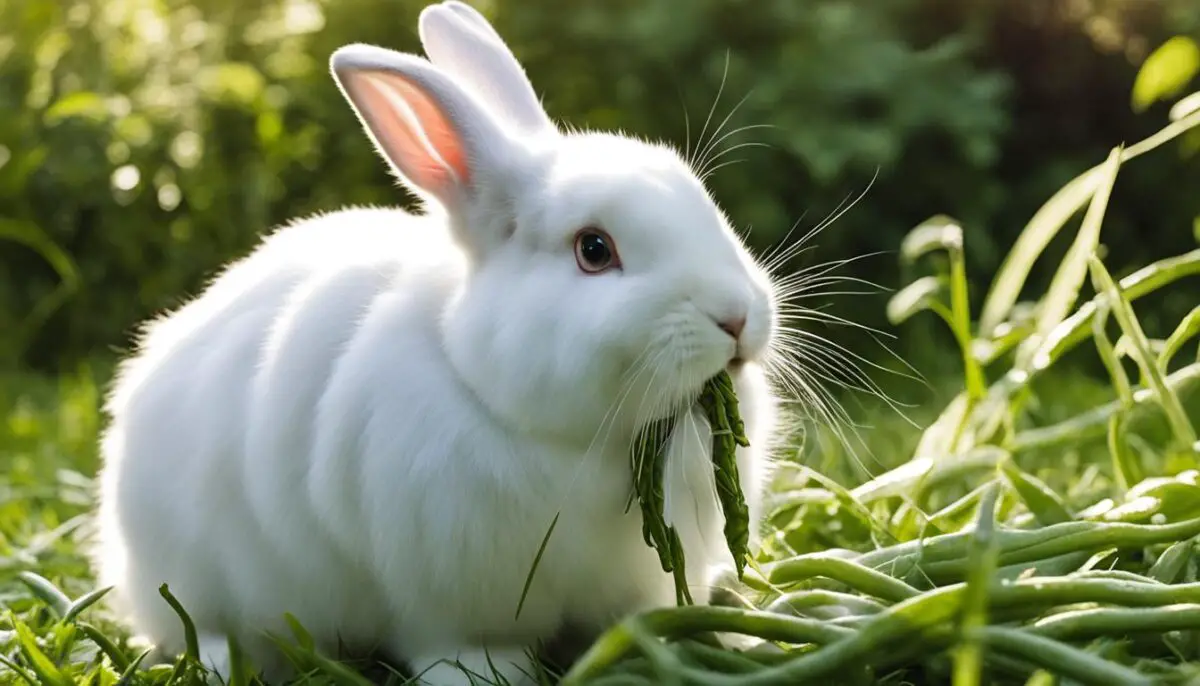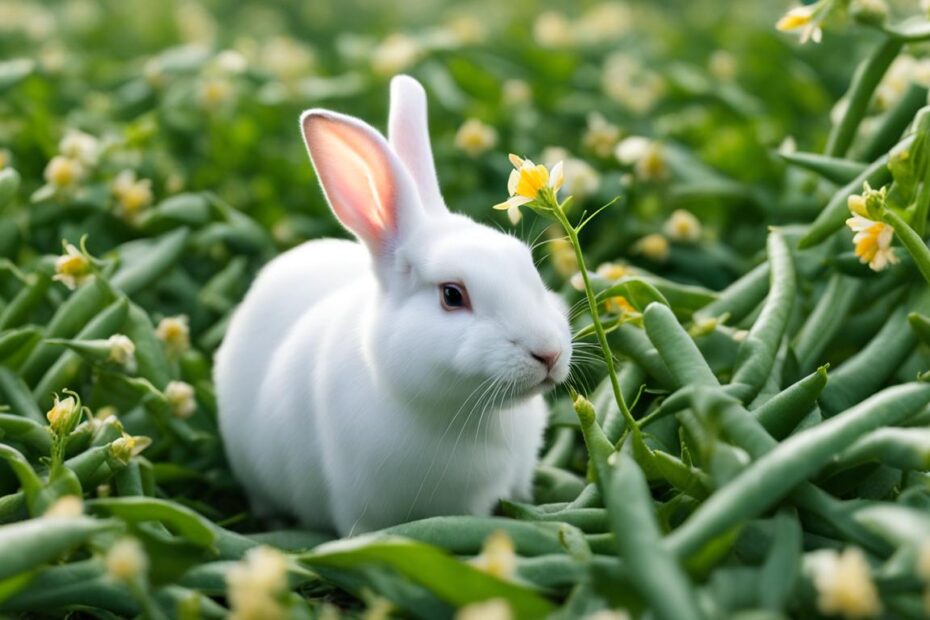Rabbits have sensitive digestive systems, so it’s important to be careful about what you feed them. Many pet owners wonder, can rabbits eat beans? While rabbits can enjoy a varied diet that includes vegetables, not all types of beans are safe for them to consume.
When it comes to beans, green beans are the most commonly asked about. Green beans can be given to rabbits in small amounts on an infrequent basis, but feeding them too regularly can cause gas, which can be dangerous to their health. It’s important to understand that green beans should be seen as occasional treats rather than a standard part of a rabbit’s diet.
Rabbits thrive on a diet that mainly consists of hay or grass. Vegetables, including green beans, should only serve as supplemental treats. Prioritizing hay or grass helps ensure that rabbits get the necessary fiber and nutrients for their overall health and well-being.
Key Takeaways:
- Rabbits have sensitive digestive systems and should be fed a carefully balanced diet.
- Green beans can be given to rabbits in small amounts on an occasional basis.
- Feeding rabbits too many green beans can lead to gas and digestive issues.
- Hay or grass should be the main source of nutrition for rabbits.
- Vegetables, including green beans, should be treated as supplemental treats.
Are Green Beans Safe for Rabbits to Eat?
Rabbits can enjoy the nutritional benefits of vegetables, and green beans can be included in their diet on rare occasions. However, it’s important to exercise caution and moderation when feeding rabbits beans, including green beans. While safe in small amounts, consuming large quantities of green beans can lead to gas and digestive issues in rabbits. Therefore, it’s best to offer green beans as occasional treats rather than a regular part of their diet.
Rabbits should primarily obtain their nutrition from hay or grass, which are essential for their digestive health. Vegetables, including green beans, should be considered supplementary treats and given in rotation with other safe vegetables to prevent overeating or stomach problems.
To ensure a balanced diet for your rabbit, it’s important to provide a variety of vegetables and prioritize hay or grass as the main source of nutrition. By incorporating green beans and other vegetables in moderation, you can contribute to your rabbit’s overall well-being.
Benefits of Green Beans for Rabbits:
Green beans offer several nutritional benefits for rabbits when given in appropriate portions. They are low in calories and high in fiber, making them a healthy addition to their diet. Additionally, green beans are rich in vitamins A, C, and K, as well as minerals such as potassium and manganese.
Dangers of Overfeeding Green Beans to Rabbits:
As with any food, it’s crucial to avoid overfeeding rabbits with green beans. Excessive consumption can lead to digestive issues, including gas, bloating, and discomfort. To prevent these problems, it’s recommended to limit green bean intake and ensure that rabbits receive the majority of their nutrition from hay or grass.

| Benefits | Cautions |
|---|---|
|
|
Note: The table above provides a summary of the benefits and cautions of feeding green beans to rabbits. It’s essential to follow proper portion control and prioritize a balanced diet with hay or grass as the main component.
How to Introduce Green Beans to Your Rabbit’s Diet
When it comes to incorporating green beans into your rabbit’s diet, it’s essential to start slowly and watch for any adverse reactions. Follow these steps to introduce green beans to your furry friend:
- Wash and chop: Begin by thoroughly washing and chopping the green beans into small, bite-sized pieces. This ensures they are easier for your rabbit to consume and digest.
- Offer a small piece: Take a small piece of the chopped green bean and offer it to your rabbit. Observe their reaction closely to assess if they show any signs of discomfort or digestive distress.
- Monitor frequently: If your rabbit eats the green bean without any adverse reactions, you can gradually start incorporating small quantities into their diet, about once a week. However, it’s important to monitor their digestive system regularly to ensure they are eating and pooping normally.
- Replace if necessary: If your rabbit experiences any digestive distress, such as bloating or diarrhea, it’s crucial to remove green beans from their diet immediately. Instead, you can replace them with other safe vegetables to maintain a balanced diet.
Remember that every rabbit may have different sensitivities, so close observation and individual adjustment to their diet are key. By introducing green beans slowly and monitoring your rabbit’s reaction, you can ensure their safety and well-being.

Cooking Green Beans for Rabbits: Yes or No?
When it comes to feeding rabbits, their delicate digestive systems require special attention. But what about cooking green beans for them? Let’s explore whether it’s safe or not.
The answer is simple: No, it is not necessary to cook green beans for rabbits. Their digestive systems are naturally designed to handle raw foods, making cooked vegetables unnecessary and potentially harmful to their health.
To provide rabbits with the best nutrition, fresh, washed, and chopped green beans should be given to them in small quantities. Raw green beans retain their nutritional value and are safer for rabbits to consume.
“It is not necessary to cook green beans for rabbits. Their digestive systems are designed to handle raw foods, so cooked vegetables are not recommended.”
Cooking green beans, especially in salty water or canned in brine, can be dangerous for rabbits. These processes can strip away the natural nutrients and introduce harmful additives that may upset their delicate digestive balance.
Instead, offer raw green beans as part of a varied diet for your rabbit. This ensures they receive essential vitamins and minerals while reducing the risk of digestive issues.
Benefits of Raw Green Beans for Rabbits
Raw green beans offer several nutritional benefits for rabbits:
- High in fiber: Green beans contain a significant amount of dietary fiber, which promotes healthy digestion in rabbits.
- Rich in vitamins: They are a good source of vitamins A and C, essential for maintaining a rabbit’s overall health and immune system.
- Low in calories: Green beans are a low-calorie treat for rabbits, making them a healthy option for weight management.
By feeding raw green beans to your rabbit, you’re providing them with a tasty and nutritious addition to their diet.
| Raw Green Beans | Cooked Green Beans |
|---|---|
| Retain nutritional value | May lose some nutrients during the cooking process |
| Safe for rabbit consumption | Potentially harmful if cooked in salty water or canned in brine |
| Provide essential dietary fiber | Fiber content may be reduced or altered |
| Low in calories | Calorie content may increase when cooked in oil or butter |
As you can see from the table above, raw green beans offer superior nutritional value and safety compared to cooked green beans.
Remember, while it’s safe for rabbits to enjoy raw green beans, it’s important to keep their diet diverse and prioritize hay or grass as the main source of nutrition. Vegetables, including green beans, should be given in moderation as supplementary treats.
Conclusion
While green beans can be a tempting addition to a rabbit’s diet, it’s important to exercise caution and moderation. Rabbits can eat beans, but they should be offered as occasional treats rather than a staple food. Prioritizing hay or grass as the main source of nutrition is crucial for maintaining a rabbit’s digestive health and overall well-being.
When introducing green beans to a rabbit’s diet, start with small quantities and closely monitor their reaction. If any signs of gastrointestinal distress, such as bloating or diarrhea, occur, green beans should be removed from their diet. It’s important to provide a balanced and varied diet for rabbits, incorporating a mix of vegetables and the core hay or grass component.
Rabbit owners should prioritize their pet’s health and nutritional needs by consulting with a veterinarian for specific dietary recommendations. By ensuring a well-rounded diet and avoiding excessive consumption of any single food, rabbits can thrive and enjoy occasional green bean treats as part of their overall nutrition plan.
FAQ
Can rabbits eat green beans?
Yes, rabbits can eat green beans, but they should be given in small amounts on an infrequent basis.
Are green beans safe for rabbits to eat?
Green beans are safe for rabbits to eat, but they should be seen as occasional treats rather than a standard part of their diet.
How should I introduce green beans to my rabbit’s diet?
Start by offering a small piece of washed and chopped green bean to your rabbit. If they eat it without any digestive issues, you can give green beans in small quantities, about once a week.
Do I need to cook green beans for rabbits?
No, it is not necessary to cook green beans for rabbits. Their digestive systems are designed to handle raw foods, so fresh, washed, and chopped green beans should be given to them as treats.
Can green beans be a staple food for rabbits?
No, green beans should not be a staple food for rabbits. Hay or grass should be the main source of nutrition, and green beans should be given in small quantities as supplemental treats.


